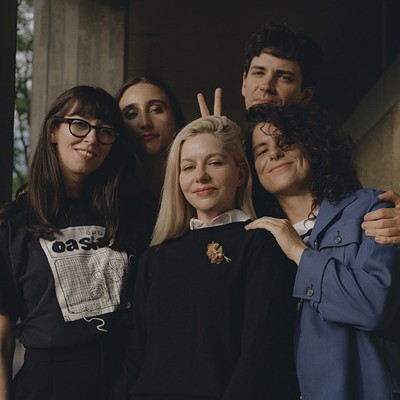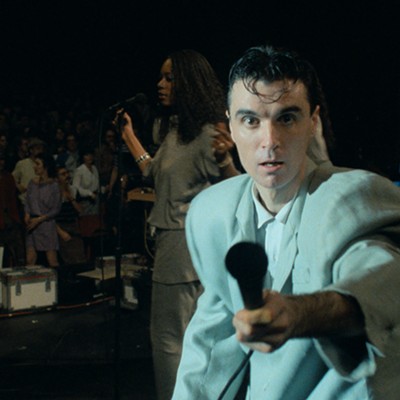THE ASCENSION, SUFJAN STEVENS
Sufjan Stevens seems most comfortable working within the framework of a recognizable concept, from the now-abandoned Fifty States Project that made him a star to his last LP Carrie & Lowell, which was structured as a catalog of childhood memories both mundane and traumatic. The singer-songwriter's latest release, The Ascension, is less narratively conceptual than it is sonically so, a collection of shuffling, stuttering electronic soundscapes that are equal parts suffocating and freeing.
Stevens recorded the album with a pared-down collection of equipment on his farm in the Catskills, and it rambles and wanders for a full 80 minutes, which is even longer than the multi-era epics that made him famous in the early 2000s. It's too unruly and undisciplined for its own good, but you also get the sense he's working through some shit as his chilly synth soundscapes move through influences like Krautrock, Depeche Mode, '90s trip-hop and Amnesiac-era Radiohead. It's always beeping, whirring, hiccuping and glitching, with Stevens' famously ethereal, gossamer voice at the center.
The Ascension is an about-face from 2015's brilliant Carrie & Lowell, whose songs were so spare and so intimate that you could practically feel Stevens in the room with you. This isn't the first time Stevens has experimented with these sorts of sounds — if anything, it feels like a companion piece to 2010's divisive and synth-drenched The Age of Adz — particularly on "Ativan," which comes on like an aural anxiety attack, and "Die Happy," which repeats its central refrain over and over again so that its meaning shapeshifts from defeatist to acceptance.
The record's back half is stronger and more focused than the front, and it's where all the best songs are, in particular the shuffling "Goodbye to All That" and the gorgeous title track. The album closes with the 12-minute "America," released as a lead single back in July, which looks with remorse at a country that Stevens has lost faith in ("I have loved you, I have grieved / I'm ashamed to admit I no longer believe").
But Stevens has always been a romantic pessimist, if such a thing exists. Whether he's detailing his own mental health, the tragic fate of an imaginary couple or the dark backroads of U.S. history, there's always a sense that he doesn't truly believe we're all doomed. "I lost my faith in everything," he admits at one point, but immediately bounces back: "Tell me you love me anyway."
SHORE, FLEET FOXES
When they became unlikely indie stars a little over a decade ago, Fleet Foxes were amongst the wave of 20-somethings who worshipped at the altar of the Woodstock era, gaining an audience with earnest throwback songs that would have seemed hopelessly uncool only a short time before. All these years later and the band still stands as a shrine to the gods of '70s album rock, but their personal sensibilities remain firmly intact.
Shore is Fleet Foxes' first LP since 2017's Crack-Up, which marked the band's return to making new music following a three-year hiatus. The break clearly refreshed them, because they returned to the studio with more energy and artistic playfulness than they'd had in previous records, and that sense of experimentation continues here.
Fleet Foxes mastermind Robin Pecknold has said that he was aiming for a warmer, brighter sound on Shore, and true to its title, so many of the tracks have the zen-like feeling of water lapping at the sand. Consider "Featherweight," with its cascading pianos, or the stories-high choral arrangement (reportedly taken from vocal samples on Instagram) that envelops "Can I Believe You."
The band's reverence to the past (both of rock's and their own) shows up in the bright horn licks of "A Long Way Past the Past," which bring to mind early Steely Dan and even Todd Rundgren, while the layered harmonies and spare, hymnal-like softness of "For a Week or Two" and "I'm Not My Season" recall vintage Fleet Foxes.
For all its sun-dappled sweetness, darkness does creep into the lyrics, particularly on album highlight "Sunblind." The song was inspired by Pecknold's grandfather suffering a stroke, and it namechecks recently deceased American songwriters like David Berman and John Prine. But it's also paying happy tribute to these fallen artists, as Pecknold's lyrics evoke an escape into the country for a weekend getaway, all his favorite records in tow.
At 54 minutes, Shore is a bit overlong (not as long as the Sufjan record, of course, though it is worth noting that the horn arrangement on penultimate track "Cradling Mother, Cradling Woman" bears striking resemblance to Stevens' early work). But Fleet Foxes' gentle pastorals are just what I needed right now, one last gasp of late-summer reverie during a season that was far from normal. ♦

























